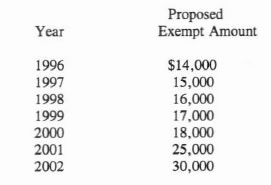Number:104-15
Date: December 15, 1995
SENATE FINANCE COMMITIEE APPROVES
RETIREMENT EARNINGS TEST BILL
On December 14, 1995, the Senate Finance Committee unanimously approved S. 1470, the "Senior Citizens' Freedom to Work Act of 1995." The Senate is expected to take action on this legislation before the end of the year.
On December 5, the House passed H.R. 2684, the "Senior Citizens' Right to Work Act of 1995" (Legislative Bulletin No. 104-14). While several provisions of that bill are similar to the provisions of S. 1470, only the provision to increase the earnings test annual exempt amount is identical in both bills.
As approved by the Senate Finance Committee, S. 1470 includes the following:
Increase in the Earnings Test Annual Exempt Amount
- Beginning in 1996, gradually raise the earnings limit for the retirement earnings test (RET) for beneficiaries who have attained normal retirement age to $30,000 by 2002 (compared with $14,760 under current law based on the intermediate assumptions in the Trustees Report). The applicable 1996 exempt amount under current law is $11,520. Exempt amounts under the bill would be:

After 2002, the annual exempt amount would be indexed to growth in average wages.
The substantial gainful activity (SGA) amount applicable to individuals who are statutorily blind would no longer be linked to the RET exempt amount for individuals ages 65 to 69. Instead, the SGA amount for blind peop le would continue to be adjusted annually as under present law, i.e., based on the national average wage index.
Denial of Disability Benefits to Drug Addicts and Alcoholics
Prohibits disability insurance (DI) and supplemental security income (SSI) eligibility to
individuals whose drug addiction andlo r alcoholism (DAA) is a contributing factor
material to the finding of disability . This provision would apply to individuals who
file for benefits on or after the date of enactment and to individuals whose claims are
adjudicated on or after the date of enactment. This provision applies to current
beneficiaries on January 1, 1997. If current beneficiaries whose benefits terminate
because of this provision reapply for benefits within 120 days after the date of
enactment, SSA must make new medical determinations for such individuals no later
than January 1, 1997.
Applies representative payee requirements to any PI or SSI beneficiary who is unable to manage their benefits due to a DAA condition, as determined by the Commissioner. SSA would refer these individuals to the appropriate State agency for treatment. These provisions would apply to applications filed after the date of enactment.
Provides an appropriation of $50 million for each of FYs 1997 and 1998 to carry out on a priority basis activities relating to the treatment of drug and alcohol abuse under the Public Health Service Act.
Dependency Test for Stepchildren
- To get benefits, a stepchild would have to be receiving at least one-half support from the stepparent when the child's claim is filed. (The option for finding dependency based on living-with would be eliminated.) This provision would be effective for benefits of individuals who become entitled after the third month following the month of enactment.
If the natural parent and the stepparent of an entitled stepchild divorce, benefits to the stepchild based on the work record of the stepparent would terminate the month after the month in which such divorce becomes final. This provision would be effective for final divorces occu rring after the third month following the month of enactment.
Continuing Disability, Renew (CDR) Administration Revolving Account for Title II Disability Benefits
- Establishes through FY 2002 a CDR Administration Revolving Account in the
Federal Disability Insurance (DI) Trust Fund as a source of non-appropriated
administrative funds to help finance DI CDRs. The account would be initially
funded with $300 million transferred from amounts otherwise available in the
DI Trust Fund and would thereafter be credited at the start of each fiscal year
with an amount equal to the estimated present value of savings to the OASDI
and Medicare Trust Funds (as certified by SSA's Chief Actuary) fiowing from
CDRs conducted in the prior fiscal year. Expenditures from the Account could be used only for the purpose of conducting CDRs.
- Requires explicit annual certifications from SSA's Chief Actuary. Therefore, the provision also establisbes statutorily the position of Chief Actuary.
- Requires the Commissioner to include in SSA's CDR Report to Congress a final accounting of the amounts transferred to the Account during the year, the amount made available from the Account during the year pursuant to certifications made by SSA's Chief Actuary, and the expenditures made for processing CDRs during the year, including a comparison of the number of CDRs conducted during the year with the estimated number of CDRs upon which the estimate for such expenditures was made.
- The provision is applicable only for fiscal years beginning on October 1, 1995,
through September 30, 2002, and sunsets October 1,2002.
Investment of Social Security and Medicare Trust Funds
Would prohibit the Secretary of the Treasury from refraining from investing Social Security and Medicare Trust Fund monies in Federal securities, and from redeeming securities held by the trust funds, to avoid increasing or to reduce outstanding public debt obligations. Effective upon enactment.